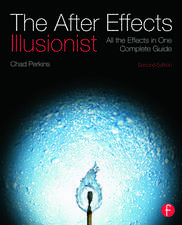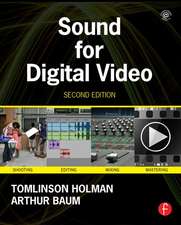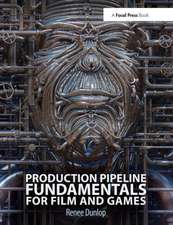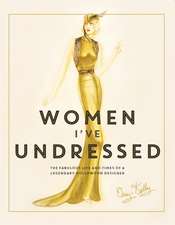The Producer's Playbook: Real People on Camera: Directing and Working with Non-Actors: The Producer's Playbook
Autor Amy DeLouiseen Limba Engleză Hardback – 8 apr 2016
- Ample case studies with perspectives from industry professionals interviewed by the author, as well as her own plentiful stories from the field
- Tips are featured in sidebars throughout the text, so that readers can see how the information applies to real situations
- Full-color photographs allow readers to visualize real world production situations
- The appendix includes useful templates and checklists for working producers
| Toate formatele și edițiile | Preț | Express |
|---|---|---|
| Paperback (1) | 335.42 lei 6-8 săpt. | |
| Taylor & Francis – 6 apr 2016 | 335.42 lei 6-8 săpt. | |
| Hardback (1) | 764.20 lei 6-8 săpt. | |
| Taylor & Francis – 8 apr 2016 | 764.20 lei 6-8 săpt. |
Preț: 764.20 lei
Preț vechi: 1102.76 lei
-31% Nou
Puncte Express: 1146
Preț estimativ în valută:
146.23€ • 153.08$ • 120.100£
146.23€ • 153.08$ • 120.100£
Carte tipărită la comandă
Livrare economică 05-19 aprilie
Preluare comenzi: 021 569.72.76
Specificații
ISBN-13: 9781138920491
ISBN-10: 1138920495
Pagini: 228
Dimensiuni: 152 x 229 mm
Greutate: 0.45 kg
Ediția:1
Editura: Taylor & Francis
Colecția Routledge
Seria The Producer's Playbook
Locul publicării:Oxford, United Kingdom
ISBN-10: 1138920495
Pagini: 228
Dimensiuni: 152 x 229 mm
Greutate: 0.45 kg
Ediția:1
Editura: Taylor & Francis
Colecția Routledge
Seria The Producer's Playbook
Locul publicării:Oxford, United Kingdom
Public țintă
Professional Practice & DevelopmentDescriere
Producer’s Playbook: Real People on Camera is a no-nonsense guide for producers looking to get the best performances from "real people" to tell powerful stories on video. Director/producer Amy DeLouise brings years of experience to this resource for creating the best on-screen impact with non-actors for interviews, re-enactments, documentary and direct-to-camera messages. With useful case studies and tips on everything from managing locations and budgeting to strategies for managing crews and the expectations of executive producers and clients, this is an invaluable resource for professionals working in reality TV, documentary, corporate video, and more.
Cuprins
I. Introduction
Ch. 1 Getting to Know Your Subjects
Ch. 4 Tools and Strategies
Ch. 9 Defining the Mission
- Motivation and goals for this book
- The opportunities inherent in using "real people," not pro’s
- How to use the tools and case studies in this book for a wide range projects involving real people on camera-- reality TV, documentary, podcasts, journalism, news magazine, and short-form non-fiction such as corporate, issue advocacy, education and training.
Ch. 1 Getting to Know Your Subjects
- Researching Your Characters
- Validators and Character Foils
- Casting & Pre-Qualifying
- Casting Children
- Phone Pre-interviews
- Rounding up visual assets (photos, video, etc.)
- Knowing handlers
- When Pre-Interviews or Casting Aren’t Possible or Wise
- Budgeting and Bidding
- Scheduling to allow creativity and spontaneity
- Location Scouting
- Locations for Interviews
- Locations for re-enactments and b-roll
- Location agreements
- Talent Releases
- Other rights to be aware of
- Music rights
- Copyrighted artwork/sculptures/architecture
- Story Arc Planning
- When Reality Demands a Script
- Planning for Scenarios and Re-enactments
- Planning for B-roll
Ch. 4 Tools and Strategies
- Tapping into the Inner Performer
- Introducing Your Team
- Using Hair & Makeup as a "Way In"
- Managing EP’s and Handlers
- Coaching without scaring
- To Rehearse or Not to Rehearse?
- Working with VIP’s and Experts
- Working with Children
- Nervous or Worried Subjects
- Teleprompters
- From iPads and do-it-yourself to prompter operator systems
- Green-screen: When it works, when it doesn’t
- Camera Set-up Layouts and Recommendations
- Case Studies: from Justin Bieber to Annie Lennox
- Maximizing the Advantages of Real People in Scenes
- Scenario vs Re-enactment: Which Do You Need?
- Scenario Shot Planning
- Obstacles and How to Avoid Them
- Challenging Scenario Settings
- Directing Kids in Scenarios
- Planning in the Field that affects Your Edit
- Master Shots, Camera Set-ups and Alternates
- Coverage Options with Video Cameras and DSLRs
- Post Production Strategies
- Tips for keeping on schedule & budget
- Case Study: Operating room safety "right way" "wrong way"
- Case Study: Documentary re-enactment
- Preparing for Your Interview
- Camera setup and interviewer on or off-camera decisions
- Setting Your Subject at Ease
- Location considerations
- Crew positioning
- Creating a Story Arc with Interview Questions
- When to use Talking Points, When to Avoid Them
- Learning Styles and How They Impact Your Interview Strategy
- Getting B-roll of Interview Subjects
- Planning for Interview Post
- Transcriptions, Audio recognition, and making your editor happy
- Future-Proofing
- Edit Workflows for Multiple Deliverables
- Camera Set-up Recommendations (1-camera and 2-camera)
- Tips for keeping on schedule & budget
- Young children
- Traumatized Subject
- Nervous/inexperienced
- VIPs, Celebrities and Experts
- ESOL & When to Use a Translator
- Experienced Interviewees
- Case Study: Palestinian youth in outside location
- Case Study: Philanthropic women in studio
- Case Study: Appalachian families at home
- Case Study: Woman who lost a child to SIDS
Ch. 9 Defining the Mission
- Connecting to Strategic Plans
- Knowing the Players
- Tools for Information-Sharing
- Creating Value and Multiple Deliverables
- Setting Expectations
- Selecting the Right Team
- Food Matters
- Thanking and Mentoring
- Group Think and How to Avoid It
- Strategies for Silos and Management Styles
- Turning Challenging People into Team Players
- Button-Pushers, Non-Deciders and People with Other Agendas
- Big Personalities and Inexperienced Leaders












